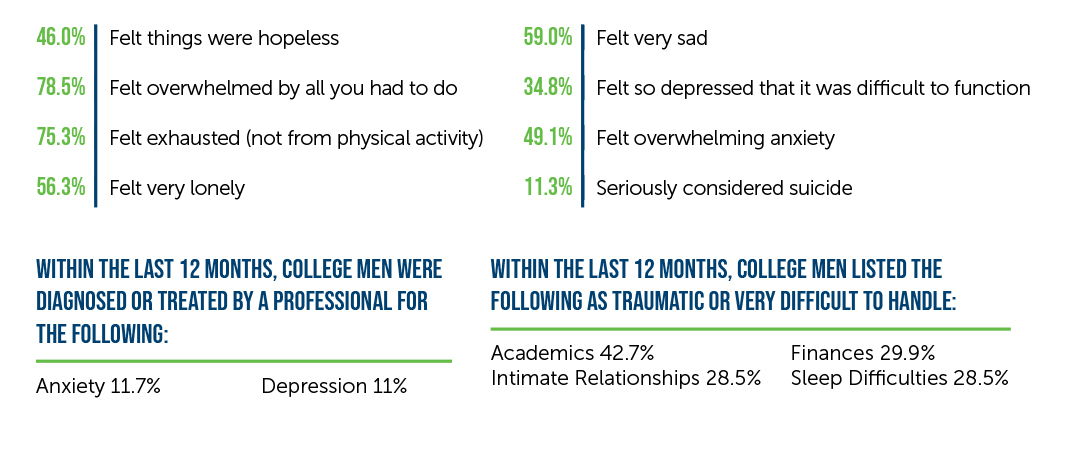Mental Health
Understanding Mental Health in College Men and How to Help
By Dr. Sara Jahansouz Wray, Director of Loss Prevention

More students than ever before are entering college with mental health concerns. In fact, one in four students suffers from a diagnosable mental illness. Even those without a diagnosable condition are likely to experience feeling overwhelmed, lonely or anxious.
Many factors that affect the mental health and wellness of college students come from the natural progression into adulthood. For the first time, many students are balancing academic workload while being concerned about financial obligations. They are investing time and energy in creating meaningful and intimate relationships. A great deal of students also struggle with sleep due to complex living arrangements. Each of these factors, especially when combined, can lead to serious mental health issues if not addressed.
With these national trends regarding mental health, Delta Upsilon volunteers and staff are also reporting concerns about mental health and wellness for our undergraduate students. With the Fraternity’s mission of Building Better Men, we must ensure that we are de-stigmatizing mental health issues and empowering brothers to assist one another. As such, DU has invested in collecting a number of resources from highly trained psychiatrists, therapists, university partners and volunteers to better understand the ways we can prioritize the health and wellness of our brothers.
Delta Upsilon already requires all associate members to complete the online GreekLifeEdu course prior to Initiation (which addresses mental health, hazing and sexual assault prevention) and offers educational sessions around mental health at Fraternity programs like Presidents Academy, Regional Leadership Academy, Advisors Academy and the Leadership Institute. Now, this summer, DU is releasing this article and new online resources aimed to help advisors and undergraduate chapter members identify and address mental health concerns with brothers. Together, we must make it a priority to help our men engage in educational programming that helps them prioritize the complexities of the undergraduate experience and best prepares them to manage all their priorities in a healthy manner.
Mental Health In College-Aged Men
To help our undergraduate men take charge of their mental health, we must first have a better understanding of the mental health issues affecting men.
The American College Health Association National College Health Assessment Executive Summary from spring 2018 shares the following demographics based on students identifying as male:

Substance Abuse
It has been found that mental health issues are often correlated with substance abuse. MentalHealth.gov shares that more than one in four adults living with serious mental health problems also has a substance use problem. In addition, substance use problems occur more frequently with certain mental health problems, including depression, anxiety disorders, personality disorders and schizophrenia.
MentalHealthAmerica.net notes that approximately one in five men develop alcohol dependency during their lives.
Suicide
Suicide is an area of great concern for men in North America. Us.movember.com states that, “Globally, every minute, a man dies by suicide.” In the United States, 75 percent of those who take their own lives are men, and the number of male suicides has been on the rise since 2000. MentalHealthAmerica.net also notes that “gay and bisexual men are more likely to develop mental health disorders than heterosexual men. Gay males are at an increased risk for suicide attempts, especially before the age of 25.”
General warning signs of suicide are:
- Talking about wanting to die or kill oneself
- Seeking and studying ways in which to kill oneself
- Talking about feelings of hopelessness or having no reason to continue to live, talking about feeling trapped or feelings of unbearable pain
- Talking about being a burden to friends and/or family
- Increased use or uncharacteristic use of drugs and/or alcohol
- Acting anxious or agitated—behavior is interpreted as reckless
- Odd sleep cycles—sleeping too little or sleep far too much
- Withdrawing from a group, friends, family, or obligations—keeping oneself isolated
- Showing concerning signs of rage or talking about seeking revenge against others
- Displaying extreme mood swings that cannot be justified by the environment or situation
How You Can Help

MentalHealthAmerica.net has research that indicates that men are far less likely than women to seek any sort of help or guidance for depression, substance abuse or stressful life events. This is largely due to current social norming, reluctance to engage in vulnerable conversations, and an ability to downplay any concerning symptoms. Lynch and Long (2018) identified in a recent study that there are seven key themes when looking at the barriers young men have to seeking professional help: acceptance from peers, personal challenges, cultural and environmental influences, self-medicating with alcohol, perspectives around seeking professional help, fear of homophobic responses, and traditional masculine ideals.
This means that if you have a male friend or family member who is struggling, he may not ask for help. As mentors, friends and brothers, it is often incumbent on us to start the conversation and offer support.
MentalHealth.gov suggests that if you have a brother who is displaying aspects of a mental health crisis or concern and he has reached out to you for help and/or guidance, you should first find out if the brother is getting any form of care that he may need or want. If not, connect him with on-campus or private resources in order to help. Do not be afraid to express your own observations from a context of care and concern for the brother. Be certain to remind your brother that help is readily available—especially with resources on a college campus—and that mental health problems can be treated by a team of practitioners until you find the right fit for you.
When you are alerted that there is concern for a brother’s mental health and wellness, be sure to ask questions, listen to all ideas, and be responsive when an issue has been identified or a group of people are concerned. When engaging with the brother displaying concern, reassure him that you care about him. This is very important for him to hear.
Some brothers may need assistance with accomplishing everyday tasks for a period of time, so make it a priority to provide as much assistance as you can for a pre-determined amount of time. Include your brother in your plans and continue to invite him to participate in healthy activities with you without being overbearing, even if your brother declines your invitations.
Provide the brotherhood in general with educational opportunities to learn about mental health and wellness, emphasizing the need for support and guidance over any type of discrimination. Ensure that chapter members and any volunteers working with the chapter understand the importance of treating a brother with a mental health problem in ways grounded in respect, compassion and empathy.
Elizabeth Brown Crawley, a Delta Upsilon volunteer and mental health professional states, “If you recognize a symptom, change in behavior, or think something isn’t right, don’t rationalize the behavior or downplay the symptom. Make sure you take everything seriously and engage in a conversation checking in about whatever it is you notice. Helping a brother out is as simple as asking him a question.”
Working with men enrolled in college provides avenues for help and guidance that the average adult may not have access to. Many colleges and universities house wellness centers, counseling centers, and/or health services often staffed by a psychiatrist who is licensed to provide mental health related medication. Most counseling service departments provide 24-hour on-call counseling seven days per week. The most common way to secure an appointment after hours is by calling the campus public safety department and requesting a session with the on-call counselor. The on-call counselor will work with the student to find the most appropriate location to meet for an after-hours session. If the brother is displaying harmful behavior to self and/or others, public safety should be notified in order to follow campus protocol for keeping all students, faculty, staff and guests safe during an urgent time.
Being the brother or volunteer that steps up to address a mental health concern can feel overwhelming at times. It is important that we all invest in ways to have conversations that convey care and concern while showing empathy, sympathy and understanding for the brother in need. We must observe the fact that mental health conditions are real and are just as serious as any other physical health issue. Brothers who are treating mental health issues are just as likely to succeed in a campus setting as any other student, as long as the proper treatment plan is put into place and followed accordingly. Always remember that by simply asking a brother a question, you could save his life.
MentalHealth.gov provides these recommendations for ways to talk with a brother about a mental health concern.
"I've been worried about you. Can we talk about what you are experiencing? If not, who are you comfortable talking to?"
"What can I do to help you to talk about issues with your parents or someone else who is responsible and cares about you?"
"What else can I help you with?"
"I am someone who cares and wants to listen. What do you want me to know about how you are feeling?"
"Who or what has helped you deal with similar issues in the past?"
"Sometimes talking to someone who has dealt with a similar experience helps. Do you know of others who have experienced these types of problems who you can talk with?"
"It seems like you are going through a difficult time. How can I help you to find help?"
"How can I help you find more information about mental health problems?"
"I'm concerned about your safety. Have you thought about harming yourself or others?"

